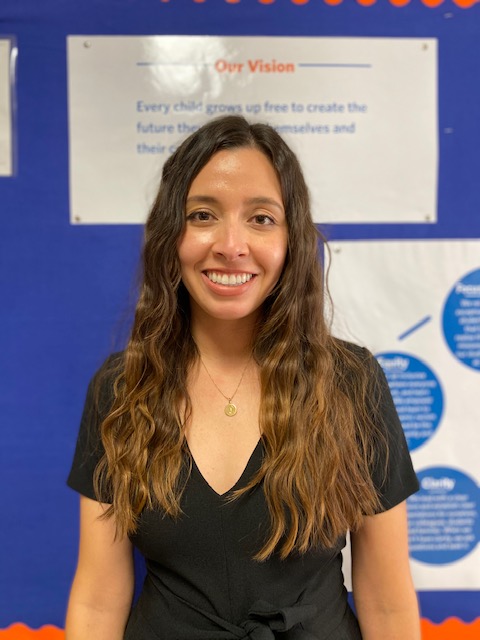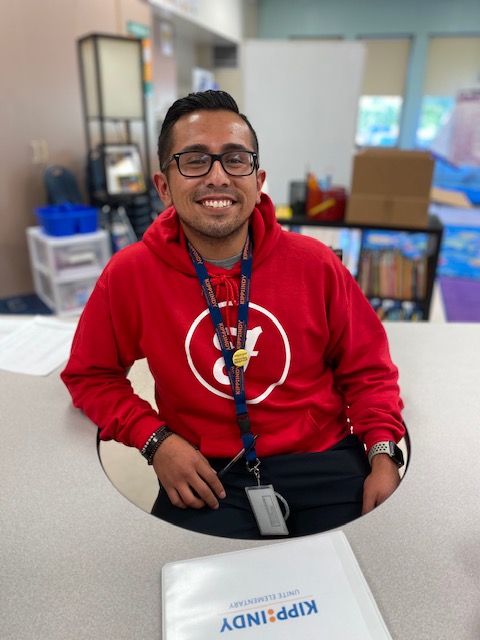This post is also available in: Español (Spanish)
In this month’s Staff Spotlight and in honor of Latinx Heritage Month, we are highlighting three KIPP Indy staff members, Martha Cortes, Tyfany Bouie, and Felipe Cuatecontzi. They share how representation affected their education and ways that schools can truly center the experiences of Hispanic or Latinx students.

Martha was born in Mexico, but grew up in Los Angeles and Monticello, Indiana. She attended Indiana University for her undergraduate degree and earned her master’s degree in Education from Stanford University. She now serves as KIPP Indy’s Managing Director of Strategic Partnerships.
Did you have Latinx educators during your K-12 school experience? How did their presence, or absence, impact you personally and/or professionally?
I went to school in two very different districts, so my experience tremendously shifted over time. However, I completed K-7 in Los Angeles. Most of my educators were Latinx and shared my family’s cultural traditions, language, experiences, etc. I will always remember my kindergarten teacher, Ms. Ramirez. Ms. Ramirez was bilingual and spoke to all the families in whatever language they were most comfortable. She invested in me and family early on and my mom became very active in the school community. When Ms. Ramirez found out that I was the oldest in my family, she began talking to me about what I wanted to be when I grew up. Like many five-year olds, I am sure it ranged from a rockstar to doctor. To help me in my journey, she gifted me a book titled, “Un Mango de Rechupete”. It was all about a little girl who would persevere in her quest to reach a highly-placed mango in a tree. This little girl developed and implemented multiple strategies to help reach her mango. She told me my mango could be a top-tier university…Stanford! As a kindergartner, I didn’t know anything about college, and even less about Stanford. However, her support help to shape the educational expectations that me and my family had moving forward. When I walked across the Stanford stage with my Masters in Policy, Organization, and Leadership studies, I was grateful for Ms. Ramirez and all the amazing educators in my life who used culturally relevant strategies to strive for educational excellence.
How can schools truly center the experiences of Hispanic and Latinx students and create a more inclusive school community?
The experiences of the Latinx community differ vastly depending on the country their family is from. My experience as an undocumented, Mexican immigrant in the 90s will be different from what our Latinx students at KIPP Indy are facing today. To truly center the experiences of our students, we need to have close relationships with their families and the community partners that provide the services outside our four walls.
What’s something you love about your culture and its significance to you?
I love family and friend gatherings! My favorite are birthday parties. There is amazing food, music, and traditions. I always looked forward to picking out my pinata and my mom would design a party theme around it. Now that I have son, we continue to keep these traditions alive.

Felipe grew up in Indianapolis and attended Wabash College for his undergraduate degree. He received his master’s degree in Education from Marian University. Felipe now serves as a Teacher of Record and ELL Teacher of Service at KIPP Indy Unite Elementary.
Did you have Latinx educators during your K-12 school experience? How did their presence, or absence, impact you personally and/or professionally?
Growing up in Indianapolis, I never had Latinx educators K-12. The absence of educators that I could identify with served as a motivating factor to pursue a career in urban education. I wanted to give Latinx elementary students the opportunity that I never had by being a teacher they could identify with.
How can schools truly center the experiences of Hispanic and Latinx students and create a more inclusive school community?
Schools everywhere can create a more inclusive learning environment for Latinx students by implementing the SIOP (Sheltered Instruction Observation Protocol) Model, as well as training staff to execute said model. Rather than allowing language barriers to keep Latinx students from being successful in the classroom, educators should be proactive and culturally responsive to the needs of the communities we serve. This will help students comprehend content covered in class as well as develop mastery of key skills they’ll need when getting into higher grade levels and more rigorous material.

Tyfany grew up in Miami, Florida, and attended Oglethorpe University for her undergraduate degree. She earned her master’s degree in Secondary Math Education from Relay Graduate School of Education. Tyfany now serves as an Assistant School Leader at KIPP Indy Unite Elementary.
Did you have Latinx educators during your K-12 school experience? How did their presence, or absence, impact you personally and/or professionally?
Growing up, I had mostly Hispanic teachers which is why I did not learn English until the 5th grade! Despite having Hispanic teachers, I did not have any afro-latino educators. This lack of representation often made me question my own heritage based on my skin color while also motivating me to pursue education and leverage my diversity within the classroom. My educational upbringing has caused me to value the different perspectives that people can bring into any environment. In my current role, I appreciate the ability to be able to connect with families from all backgrounds and to help bridge the gap for our Latinx families as they join the Unite family.
